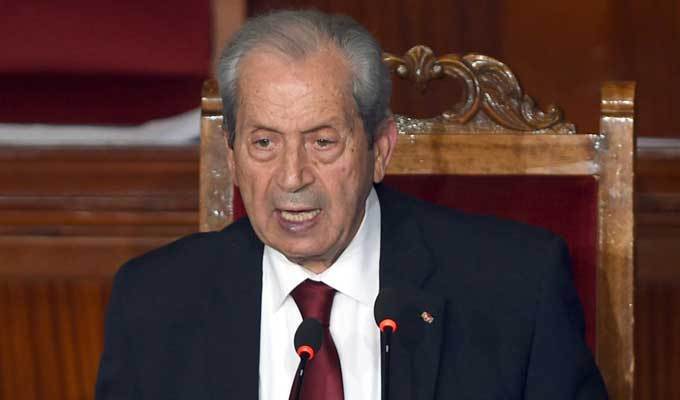

Speaker of the Tunisian parliament, Mohamed Ennaceur, was sworn in as interim president few hours after the death of President Beji Caid Essebsi in compliance with the constitution to ensure smooth transition of power until elections are conducted to for a new president. The Tunisian electoral commission announced a presidential election to be conducted on September 15, 2019, two months earlier than scheduled.
Tunisians had bid farewell to their first democratically elected President Beji Caid Essebsi at a state funeral on Saturday attended by foreign leaders including French President, Emanuel Macron, and Qatar’s Emir, Sheikh Tamim bin Hamad Al Thani.
Essebsi, who helped guide the North African country’s transition to democracy after the 2011 revolution, died aged 92 on Thursday. Tens of thousands of Tunisians lined up the streets of Tunis waving flags, chanting the national anthem and throwing roses at the funeral procession as it made its way from the presidential palace in Carthage to the Al Jallaz cemetery where Essebsi was buried.
“Goodbye president, goodbye Bajbouj,” they shouted, referring to Essebsi’s nickname.
The Tunisian red and white flag covered the late president’s coffin, which was placed on a military truck. A flypast by the military made white and red smoke in the air.
Other dignitaries at the funeral included Algerian President Abdelkader Ben Saleh, Palestinian President Mahmoud Abbas, and King Felipe VI of Spain.
Macron gave a speech at the palace, saying that Essebsi had “supported the stability of the constitution, the attachment to freedom and openness … and equality between women and men”.
“He spent his life in the service of Tunisia, preserving its gains and defending its values,” Ennaceur said in his speech. “He was a man of consensus, dialogue and national unity.”
A parliamentary vote is set for October 6.
Essebsi’s rise to prominence after the overthrow of veteran autocrat Zine El-Abidine Ben Ali was followed by revolts against authoritarian leaders across the Middle East and North Africa, including in Libya and Egypt.
In 2012 Essebsi, who served as parliament speaker under Ben Ali, founded the secular Nidaa Tounes party, now part of the governing coalition, to counter-balance the resurgence of Islamists who were suppressed under Ben Ali. Two years later, Essebsi became Tunisia’s first freely elected head of state.
The former French colony has been hailed as the only democratic success of the Arab Spring uprisings, with a new constitution, free elections and a coalition government of moderate Islamist and secular parties in a region otherwise struggling with upheaval.
But political progress has not been matched by economic advances. Unemployment stands at about 15%, up from 12% in 2010, due to weak growth and low investment.
Essebsi also faced criticism that he was seeking a return to a strong state with power concentrated in the presidency, whose role is limited to foreign and defense policies under the new constitution.
Post Views: 25
You may be interested

AFCON 2025Q: New Boy Osho, Iheanacho, Start For Super Eagles Vs Benin Republic
Webby - November 14, 2024The Super Eagles will line-up in a 3-4-3 formation in tonight’s 2025 Africa Cup of Nations qualifying tie against Benin…

My Goal Was To Achieve Success With Ten Hag At Man United –De Ligt
Webby - November 14, 2024Netherlands international Matthijs de Ligt has suggested Erik ten Hag didn’t get the breaks he needed to keep his job…

I Want To Take My Game To New Level –Lookman
Webby - November 13, 2024Super Eagles winger Ademola Lookman has reiterated his commitment to take his game to the next level.The Nigerian international, who…






















![American Pastor, David Wilson Seen Eating The Box Of Woman Who Isn’t His Wife [Video]](https://onlinenigeria.com/wp-content/uploads/2019/10/american-pastor-david-wilson-seen-eating-the-box-of-woman-who-isnt-his-wife-video-150x150.jpg)








